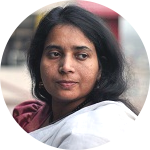
The 23 Indian school children who died after eating a school lunch consumed “very toxic" levels of agricultural pesticide, police have confirmed.
India’s flagship scheme for school children, the ’Mid-Day Meal Scheme’ is now under the microscope after the tragic death of the school children at a primary school in the northern state of Bihar on 16 July, 2013.
The incident took place in Saran district, where children who consumed the rice, lentil and soyaben meal immediately started falling sick and vomiting blood.
Four children died on their way to hospital and 19 died on arrival. A further 24children and a cook are currently undergoing treatment.
It is suspected that the oil used to cook the lunch was kept in a container that previously stored pesticide.
Scientists found the presence of monocrotophos in samples of the cooking oil and food. Monocrotophos is a compound of organophospohorus used by farmers to kill pests.
In an interview with Bloomberg, the sister-in-law of the cook said that the school principal had been told that the oil had a bad smell and strange colour and that it shouldn’t be served to the children.
But principal refused to throw away the food. Currently on the run with her family, she is wanted by police on suspicion of criminal negligence.
Biggest in the world
The ’Mid-Day Meal Scheme’ is the largest free meal programme in the world. It aims to increase school enrollment, retention and attendance by improving nutritional levels among children.
Every day, around 110 million children are served free school meals in 1.2 million government schools across the country.
In Bihar alone, for the year 2012-13 (up to March) 70,773 institutions and nearly 12 million students were covered under the scheme.
Although it has a long history going back to the 1920s, its roots as a countrywide programme began in August 1995, when the National Programme of Nutritional Support to Primary Education (NP-NSPE) was launched.
In 2001, the Supreme Court of India made the landmark decision to provide hot food to all primary school children in government schools.
But it’s a mammoth undertaking and it has not been without controversy. As well of accusations of corruption and mismanagement, last week’s deaths were far from the first health and safety incident surrounding the scheme.
The day after the 23 deaths, 15 children passed out in another district of Bihar after consuming a mid-day meal which had a dead lizard in it.
On Wednesday, a further 34 students at a tribal ashram school in Maharashtra fell ill after having their mid-day meal.
It was also reported that 100 school girls in Tamil Nadu were admitted to hospitalwith complaints of nausea and lightheadedness after eating their free school dinner on Thursday.
The central government had earlier issued a warning to Bihar state on the low levels of hygiene andsub-standard quality of food being served to the state’s children .
And a 2010 study by India’s Planning Commission found that more than 70 per cent of children in the sampled schools in Bihar were unhappy with the quality of the food served. A fifth of them said they did not get enough food and three-quarters of the schools reported they had inadequate cooking utensils.
The blame game
The tragedy has generated a considerable amount of political blowback. Following attacks by opposition parties, the Bihar government claimed it suspected a conspiracy behind the tragedy.
The state Education Minister PK Shahi told reporters that the deaths were not due to food poisoning, but rather poison in the food, and that police were investigating.
The ruling party Janata Dal is also claiming that the principal of the school, Meena Kumari, is the wife of an opposition activist and that the children were poisoned to damage the ruling party’s image.
There have been numerous protests in response to the deaths – some of which have turned violent. But the most important question is what new measures will central and state governments adopt to ensure a good standard of school meals?
In a press conference at New Delhi, the Central Human Resources Minister Dr MM Pallam Raju announced the formation of a new committee to ensure quality through the scheme nationwide.
But in many schools, children are currently refusing to eat these free lunches.
Those responsible for the gruesome incident are yet to be identified and arrested.
Meanwhile, inconsolable friends, parents and relatives are attending the mass burial of 23 children who died, in the same school playground where they used to play.
As India waits for answers, every parent in the country stands along with the villagers of Chapra, in their extreme shock and mourning.








